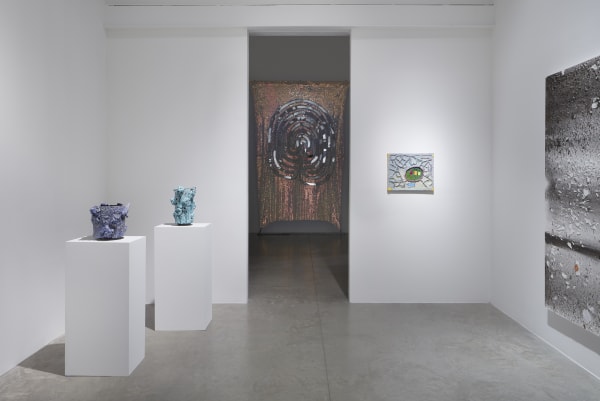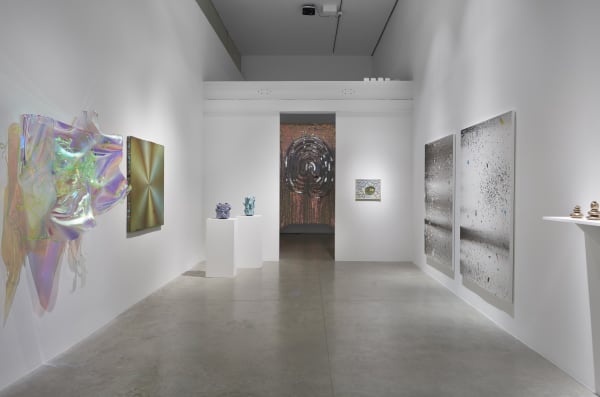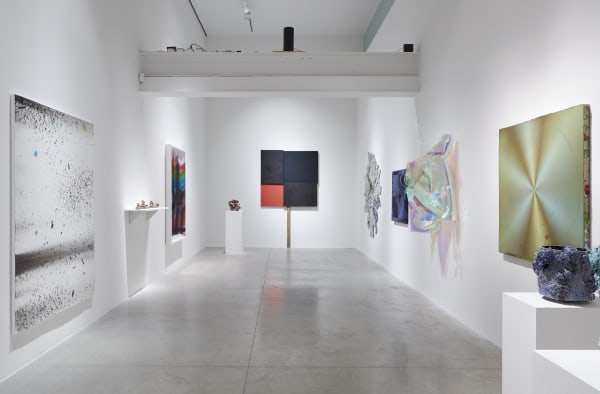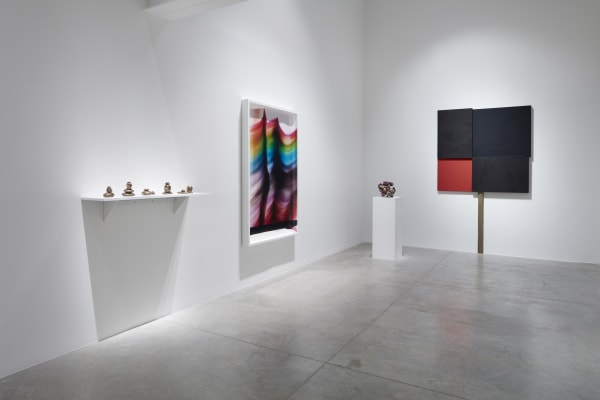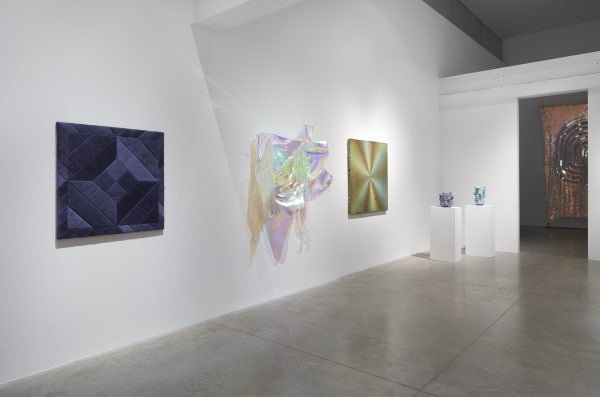Material Properties : Curated by Margaret Liu Clinton
Yvgeniya Baras, Amaryllis DeJesus Moleski, Thomas Fougeirol, Anoka Faruqee & David Driscoll, Berta Fischer, Shelia Hicks, Denzil Hurley, Tony Marsh, Joseph Magliaro, Mariah Robertson, Brie Ruais, Anna Sew Hoy, C. Spencer Yeh
NEW YORK, NY | albertz benda is pleased to present a group exhibition that brings together artists who consistently push, expand, test, and delimit material properties for the purpose of devising new formal and social effects.
Material constraint drives the generative principle of Shelia Hicks’s textile-based art works. In the work Faceted, evoking a style of directional embroidery allows Hicks to approximate light refracted through a cut stone. Hicks is not alone in her desire to emulate. In the service of preserving anonymous and ever-changing totems, Joseph Magliaro casts rounded river stones in bronze, deploying the most valuable material common to public memorial statuary.
Recalibration provokes poignant confusion in C. Spencer Yeh’s two-channel Mei-Jia & Ting-Ting & Chih-Fu & Sin-Ji two-channel audio composition. As the artist remixes his own mimetic speech recording with that of three female text-to-speech computer voices with Taiwan, Mainland China, and Hong Kong accents, local and national histories collide.
Also working with themes of psychogeography, Brie Ruais’s body sets the measure as she uses her extremities to push and pull clay in various directions before she subjects it to various glazing processes. The resulting shards of hardened clay record imprints of a body and its surrounding environment during a particular season.
For his own take on natural time and geological phenomena, Tony Marsh pushes his Crucibles to the point of breaking by firing them up to five times. If in Marsh’s work, the layered accumulation of surface treatments precipitates a hardened composite of crackle, color, shine, and porosity, then accumulation in the work of Yevgeniya Baras follows after a totally different stage of transformation, namely mastication. Once the paper is broken down into pulp, topographic masses are built up to allow the artist to paint and draw sculpturally.
Playing with the literal plasticity of colored Plexiglas, Berta Fischer bends the normally stiff material into wildly fluid and reflective waves. Glowing edges form lines that can cut through or trace the undulations of any given relief as the composition subtly shifts with the viewer’s ambulatory body and gaze. In their ongoing series of Moiré paintings, Anoka Faruqee & David Driscoll employ mathematical precision to generate illusions of light and volume as they meticulously hand-comb layers of paint. Whether calibrated, bleeding, or spilling, the colorful acrylic summons viscous and visual pleasures.
Thomas Fougeirol’s use of the same gooey medium also nods to photography, but in a far more archeological manner. The milky surfaces of two adjacent paintings share the same sooty swipes in which tiny bits of debris have been captured and suspended. It is the speed of the trails as well as the chaos of the jetsam that foreshadows the postdiluvian aftermath of the next unnatural disaster. Denzil Hurley conjoins four black, brown, and red monochromatic canvases into a square. Their combined tenor changes significantly with the addition of a single stick below the cluster. As the addition of the wood reminds us of the dowels we use to carry protest signs, Hurley rescues the monochrome from the predictability of reduction by re-inscribing it with expressive potential.
Anna Sew Hoy pulls at wet clay until gaps form. In her sculptural rejoinder to masculine 20th-century industrial heft, Sew Hoy instead defines volume by tracing voids and adorning their contours. Sharing a similarly iconoclastic ethos, Mariah Robertson’s darkroom experimentation abandons the hallowed regimen of photographic printing in favor of conjuring vivid arrangements with alchemical bravado.
Next to sound, the most immaterial ‘material’ in this array of works is that which depends the most upon light. For the sculptural installation Double Times, Amaryllis DeJesus Moleski embeds an aerial map of a labyrinth, fashioned out of holographic lamé, into a sequin curtain. The light of animated film that is projected over the curtain bounces off of and bleeds through the shimmering materials. Light is refracted in every direction, behaving less like a beam and more like water.
